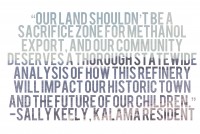FOR IMMEDIATE RELEASE
Appeal of World’s Largest Gas-to-Methanol Plant Seeks Full Disclosure of Project’s Climate, Public Health Impacts
Oct. 20, 2016 (Kalama, WA) — Today, Columbia Riverkeeper, the Sierra Club, and the Center for Biological Diversity challenged the Final Environmental Impact Statement (EIS) for the world’s largest gas-to-methanol proposal at the Port of Kalama. The Kalama, Washington, plant would consume one-third as much gas as the entire state of Washington and condemn private land to build a new pipeline. The appeal seeks full disclosure of the proposal’s air pollution, greenhouse gas emissions, and the new gas pipelines feeding fracked gas to the refinery.
“The Kalama methanol refinery would consume a staggering amount of fracked gas—more than all of Washington’s homes, industrial consumers, and gas-fired power plants. But Port of Kalama’s review ignores significant public health and environmental risks from the refinery,” said Jasmine Zimmer-Stucky, Senior Organizer for Columbia Riverkeeper. “People across the Northwest are digging in their heels to combat climate change. This project flies in the face of that hard work.”
The Port of Kalama—which stands to make millions from methanol export—was primarily responsible for the methanol refinery environmental review. State and Cowlitz County officials rely on the Environmental Impact Statement to decide whether to issue key permits for the methanol project. Columbia Riverkeeper and other groups appealed the Port’s environmental review because it:
- Misleads the public about where the methanol is going and ignores air pollution from vessels hauling methanol overseas;
- Ignores new regional gas pipeline infrastructure that will be necessary to supply the refinery's enormous natural gas use;
- Does not explain how the refinery, built on liquefaction-prone sand, would withstand a major earthquake;
- Does not adequately account for new gas drilling or the proposal’s greenhouse gas emissions.
“Tacoma took a deeper look at a similar proposal and rejected it because the Chinese-backed methanol developer was hiding some of the really big impacts--we should be doing the same,” said Sally Keely, Kalama Resident. “Our land shouldn’t be a sacrifice zone for methanol export, and our community deserves a thorough statewide analysis of how this refinery will impact our historic town and the future of our children.”
If the appeal succeeds, the Port of Kalama will have to take another crack at the environmental review and account for climate, public health, and other impacts from the project. Read the appeal of the EIS filed by Columbia Riverkeeper and other groups here.
###
About Columbia Riverkeeper
Columbia Riverkeeper protects and restores the water quality of the Columbia River and all life connected to it, from the headwaters to the Pacific Ocean. Representing over 12,000 members and supporters, Columbia Riverkeeper works to restore a Columbia River where people can safely eat the fish they catch and children can swim without fear of toxic exposure. Columbia Riverkeeper is a member of Waterkeeper Alliance, the world’s fastest-growing environmental movement, uniting more than 200 Waterkeeper organizations worldwide. For more information go to columbiariverkeeper.org.
About Center for Biological for Diversity
The Center for Biological Diversity is a national, nonprofit conservation organization with more than 1.1 million members and online activists dedicated to the protection of endangered species and wild places. For more information go to biologicaldiversity.org.
About Sierra Club
The Sierra Club is America’s oldest and largest grassroots environmental organization. For more information go to sierraclub.org.
Support our campaign to keep the world’s largest gas-to-methanol refinery off the Columbia River.



